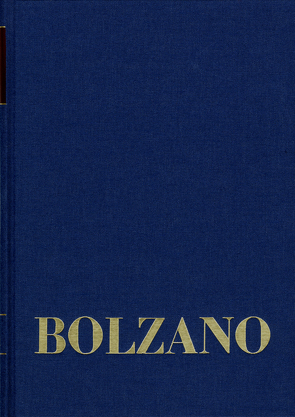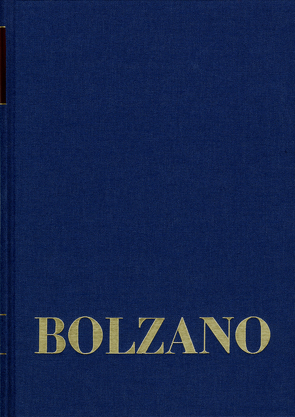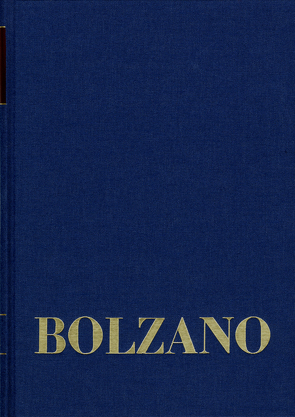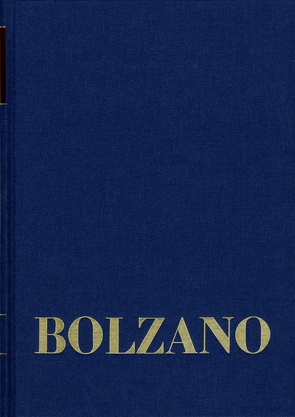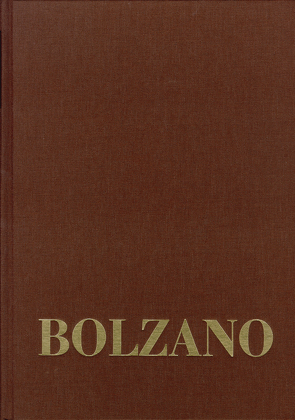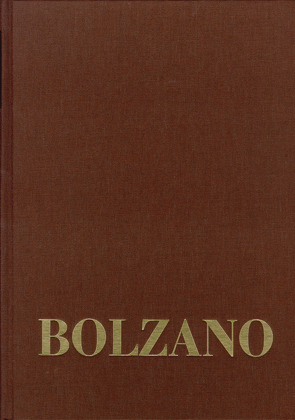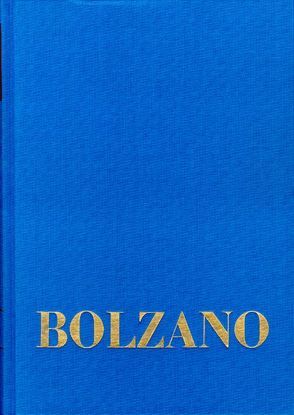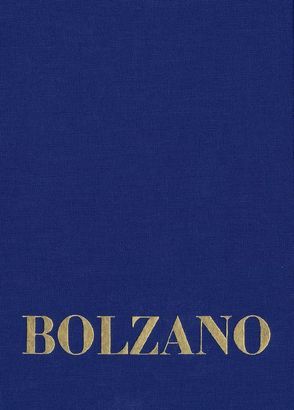Der Band enthält drei Textkörper: ›Die Akademische Pflichtenlehre‹ (1806–1808), ›Über die Standeswahl* (1818) und das ›Εrbauungsbüchlein‹ (1820–1825).
»Pflicht« ist ein Zentralbegriff in Bolzanos Ethik. Pflicht bedeutet gehöriges Benehmen der Studierenden, gegenüber Gott, sich selbst, … jedermann. Dazu gibt Bolzano Begriffsklärungen, detaillierte Ausführungen und Sekundärliteratur an.
›Über die Standeswahl‹ ist Berufsberatung ganz im Sinne des Gemeinwohls und im Interesse des Staates (Böhmens, als Teil der österreichischen Monarchie).
Das ›Erbauungsbüchlein‹ enthält religiöse Texte: Umschreibung des ›Vaterunsers‹, des ›Apostolischen Glaubensbekenntnisses‹, der ›göttlichen Tugenden‹, und das Bekenntnis: ›Mein Glaube‹. – Aus heutiger Sicht tiefreligiöse Literatur, die als solche ein dubioses Licht auf die Entlassung Bolzanos aus dem Kirchen- und Staatsdienst wirft.
Aktualisiert: 2023-06-15
> findR *
Der Band enthält drei Textkörper: ›Die Akademische Pflichtenlehre‹ (1806–1808), ›Über die Standeswahl* (1818) und das ›Εrbauungsbüchlein‹ (1820–1825).
»Pflicht« ist ein Zentralbegriff in Bolzanos Ethik. Pflicht bedeutet gehöriges Benehmen der Studierenden, gegenüber Gott, sich selbst, … jedermann. Dazu gibt Bolzano Begriffsklärungen, detaillierte Ausführungen und Sekundärliteratur an.
›Über die Standeswahl‹ ist Berufsberatung ganz im Sinne des Gemeinwohls und im Interesse des Staates (Böhmens, als Teil der österreichischen Monarchie).
Das ›Erbauungsbüchlein‹ enthält religiöse Texte: Umschreibung des ›Vaterunsers‹, des ›Apostolischen Glaubensbekenntnisses‹, der ›göttlichen Tugenden‹, und das Bekenntnis: ›Mein Glaube‹. – Aus heutiger Sicht tiefreligiöse Literatur, die als solche ein dubioses Licht auf die Entlassung Bolzanos aus dem Kirchen- und Staatsdienst wirft.
Aktualisiert: 2023-05-11
> findR *
Der Band enthält drei Textkörper: ›Die Akademische Pflichtenlehre‹ (1806–1808), ›Über die Standeswahl* (1818) und das ›Εrbauungsbüchlein‹ (1820–1825).
»Pflicht« ist ein Zentralbegriff in Bolzanos Ethik. Pflicht bedeutet gehöriges Benehmen der Studierenden, gegenüber Gott, sich selbst, … jedermann. Dazu gibt Bolzano Begriffsklärungen, detaillierte Ausführungen und Sekundärliteratur an.
›Über die Standeswahl‹ ist Berufsberatung ganz im Sinne des Gemeinwohls und im Interesse des Staates (Böhmens, als Teil der österreichischen Monarchie).
Das ›Erbauungsbüchlein‹ enthält religiöse Texte: Umschreibung des ›Vaterunsers‹, des ›Apostolischen Glaubensbekenntnisses‹, der ›göttlichen Tugenden‹, und das Bekenntnis: ›Mein Glaube‹. – Aus heutiger Sicht tiefreligiöse Literatur, die als solche ein dubioses Licht auf die Entlassung Bolzanos aus dem Kirchen- und Staatsdienst wirft.
Aktualisiert: 2023-05-04
> findR *
Der Band enthält drei Textkörper: ›Die Akademische Pflichtenlehre‹ (1806–1808), ›Über die Standeswahl* (1818) und das ›Εrbauungsbüchlein‹ (1820–1825).
»Pflicht« ist ein Zentralbegriff in Bolzanos Ethik. Pflicht bedeutet gehöriges Benehmen der Studierenden, gegenüber Gott, sich selbst, … jedermann. Dazu gibt Bolzano Begriffsklärungen, detaillierte Ausführungen und Sekundärliteratur an.
›Über die Standeswahl‹ ist Berufsberatung ganz im Sinne des Gemeinwohls und im Interesse des Staates (Böhmens, als Teil der österreichischen Monarchie).
Das ›Erbauungsbüchlein‹ enthält religiöse Texte: Umschreibung des ›Vaterunsers‹, des ›Apostolischen Glaubensbekenntnisses‹, der ›göttlichen Tugenden‹, und das Bekenntnis: ›Mein Glaube‹. – Aus heutiger Sicht tiefreligiöse Literatur, die als solche ein dubioses Licht auf die Entlassung Bolzanos aus dem Kirchen- und Staatsdienst wirft.
Aktualisiert: 2023-05-04
> findR *
Der vierte Teilband von Bolzanos Briefen an Fesl umfasst 89 Schreiben aus den Jahren 1841 bis 1845, die eine Zeit der Krisen dokumentieren: Vor allem verschlechtert sich der Gesundheitszustand von Bolzanos »Lebenserhalterin« Anna Hoffmann, bis sie am 20. April 1842 in seinem Beisein stirbt. Am Ende dieses Jahres stirbt zudem Vinzenz Fiebrich, der sich in Wien als Polizeikommissär diskret zu Bolzanos Gunsten einsetzte. Dies wirkt sich nicht nur auf Bolzanos Schaffenskraft aus, sondern auch auf seine Beziehung zu Fesl, der seinerseits in der Folge kaum mehr für Bolzano tätig ist. Dennoch gelten die Briefe auch wichtigen Projekten dieser Jahre, so der ›Beurteilenden Übersicht‹ von ›Wissenschaftslehre‹ und ›Religionswissenschaft‹ (1841) und der ›Perfectibilität des Katholicismus‹ (1845) sowie den ästhetischen Themen, denen sich Bolzano nun zuwendet.
Aktualisiert: 2023-02-09
> findR *
Der dritte Teilband von Bolzanos Briefen an Fesl ist mit 99 Briefen der umfangreichste (wobei etwa 20 Schreiben aus dem Jahr 1838 sogar verloren gegangen sind). Die Intensität der Korrespondenz in den Jahren 1837 bis 1840 hat in erster Linie mit den von Fesl betreuten Buchprojekten zu tun: In diesem Zeitraum erschienen nämlich neben der ›Wissenschaftslehre‹ noch vier weitere Bücher Bolzanos sowie die Neuauflagen der ›Athanasia‹ und der ›Erbauungsreden‹. Bolzanos Briefe dokumentieren die Vorbereitung dieser Publikationen ebenso wie deren Rezeption und die Arbeit an weiteren Publikationsprojekten (die zum Teil nie verwirklicht worden sind). Auch das einzige Treffen der beiden Freunde nach ihrer Verurteilung, das im September 1838 in Těchobuz zustande kam, findet seinen Niederschlag in den Briefen, nicht zuletzt mit Bezug auf die dort besprochenen wissenschaftlichen Vorhaben.
Aktualisiert: 2022-08-18
> findR *
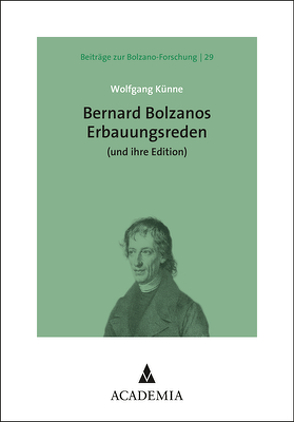
Bolzano hielt in den Jahren 1805–1819, in denen er als Professor und Studentenpfarrer in Prag tätig war, fast 680 sonn- und feiertägliche Reden. Künne beschreibt die Form dieser ‚Exhorten‘ und Bolzanos Auswahl der biblischen Ausgangspunkte. Er vergleicht die Ziele, die der Redner verfolgte, mit den Zielen, die er nach den Vorstellungen der Wiener Obrigkeit verfolgen sollte, er stellt Bezüge zu Bolzanos philosophischen Schriften heraus und kommentiert dann diejenigen Reden, in denen Bolzano die Diskriminierung der tschechischen Böhmen durch ihre deutschen Landsleute und die der böhmischen Juden durch ihre ‚christlichen‘ Landsleute anprangert, die Begriffe diverser Formen von Lug und Trug und den Begriff des Mutes analysiert und (vergebens) ein absolutes Suizid-Verbot zu rechtfertigen versucht. In der anschließenden Auseinandersetzung mit der Edition aller erhaltenen Exhorten im Rahmen der Gesamtausgabe wird das Verständnis vieler Reden durch zahlreiche Wort- und Sacherklärungen gefördert.
Aktualisiert: 2023-04-04
> findR *
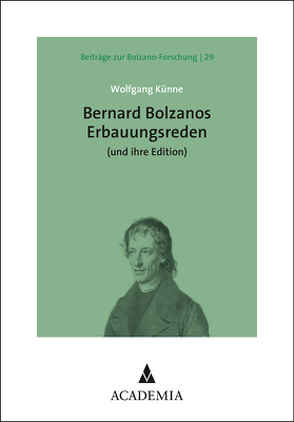
Bolzano hielt in den Jahren 1805–1819, in denen er als Professor und Studentenpfarrer in Prag tätig war, fast 680 sonn- und feiertägliche Reden. Künne beschreibt die Form dieser ‚Exhorten‘ und Bolzanos Auswahl der biblischen Ausgangspunkte. Er vergleicht die Ziele, die der Redner verfolgte, mit den Zielen, die er nach den Vorstellungen der Wiener Obrigkeit verfolgen sollte, er stellt Bezüge zu Bolzanos philosophischen Schriften heraus und kommentiert dann diejenigen Reden, in denen Bolzano die Diskriminierung der tschechischen Böhmen durch ihre deutschen Landsleute und die der böhmischen Juden durch ihre ‚christlichen‘ Landsleute anprangert, die Begriffe diverser Formen von Lug und Trug und den Begriff des Mutes analysiert und (vergebens) ein absolutes Suizid-Verbot zu rechtfertigen versucht. In der anschließenden Auseinandersetzung mit der Edition aller erhaltenen Exhorten im Rahmen der Gesamtausgabe wird das Verständnis vieler Reden durch zahlreiche Wort- und Sacherklärungen gefördert.
Aktualisiert: 2023-04-04
> findR *
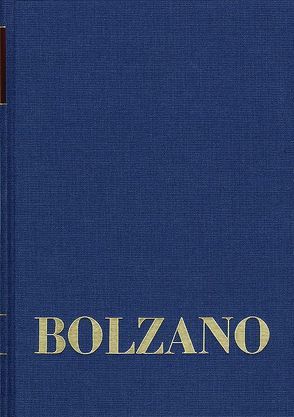
From 1805 to 1820, Bernard Bolzano was professor of »religious doctrine« (Religionslehre) at the University of Prague. The lectures he had to deliver were part of the so-called »Philosophical Studies« that every student of the university had to complete before he entered the »higher« studies, i.e. the studies of medicine, law or theology. As professor of religious doctrine, Bolzano also had the duty to deliver the homilies on Sundays and holidays during the academic year to all the students of the »Philosophical Studies«. This explains the enormous influence Bolzano exerted through these homilies on the intellectual and political life of Bohemia in his time, whose offshoots reached even the Charta 77 movement in former Czechoslovakia. The chairs of religious doctrine were established by the Austrian emperor Franz at all universities of the Austrian empire in order to shape the students into »good Christians and law-abiding citizens« as it was ordered in a decree. The homilies Bolzano had to deliver at the University of Prague (as did all professors of religious doctrine at Austrian universities) were called ›Erbauungsreden‹ (edifying addresses) or ›exhortations‹. There is evidence for 582 ›Erbauungsreden‹ Bolzano delivered as a professor at the University of Prague of which 414 are extant; of these, 153 have not yet been published at all. The 414 ›Erbauungsreden‹ that are extant have survived in different form: some of them (70) as autographs, i.e. in Bolzano’s own handwriting, others in handwritten copies of Bolzano’s manuscripts, others in notes taken by Bolzano’s students. Several collections of Bolzano’s ›Erbauungsreden‹ have already appeared in print, some of them during Bolzano’s lifetime, while others were published posthumously by his students or other editors. – The new critical edition of Bolzano’s ›Erbauungsreden‹ presents all of them in chronological order. Those which are extant will be edited on the basis of the best version which has remained. Those ›Erbauungsreden‹ which are not extant will be documented and described according to an index Bolzano himself has prepared.
Aktualisiert: 2022-08-18
> findR *
This volume, published in 1813, contains the first selection of edification speeches which Bolzano had held up to that time as a professor of Catholic religious education at the University of Prague. In these speeches, Bolzano advocated pacifist and socialist ideas and called for a humane constitution which guaranteed fundamental human rights. This led to his instant dismissal in the winter semester of 1819/20. In 1828 this edition of the ›Erbauungsreden‹ (edification speeches) was put on the index of prohibited books.
Aktualisiert: 2022-08-18
> findR *
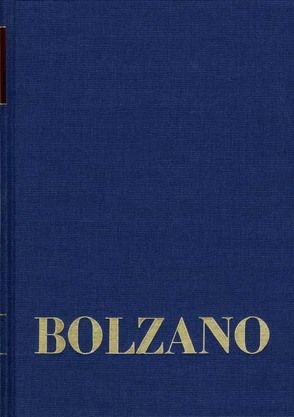
In this academic year, Bolzano persevered with his series of fundamental reforms. He began by explaining why these were necessary: It was time to replace superstition and error with a sensible faith in God and a religious enlightenment. The aim of this was to create better conditions for human beings in his native country Bohemia and ultimately everywhere on earth. He saw this as a task which could be accomplished with the combined efforts of all those who together were willing to stand up for the “good cause of mankind.” Alliances of this nature were however observed with increasing distrust by the Austrian state. This was understandable, since in his work for a better society Bolzano was pressing for social justice in all forms, was calling for a “more reasonable“ constitution, wanted to replace hereditary nobility with nobility of mind etc. His statements indicating that anyone who did not make every effort to support the common good did not deserve to live as far as he was concerned show how radical his thinking was in these issues. He condemned the misuse of intelligence such as ”deceiving the world because it wanted to be deceived,“ as well as the abuse of religion. He recognized the excessive enthusiasm with which mainly those who were wise in the ways of the world or the romantics in Germany were afflicted in his time as a dangerous kind of rampant scientific uncertainty. He was not grimly determined in his way of doing things, but rather of a “cheerful disposition.”
Aktualisiert: 2023-03-14
> findR *
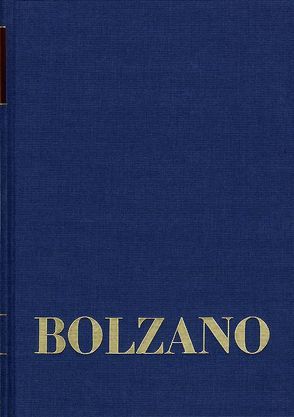
In the first speech he held after taking a break for two and a half years due to illness, Bernard Bolzano bemoaned the death of his sister Franziska, at whose sick bed his latent lung disease had gotten much worse and became life-threatening. He did however also announce that he was undaunted and would continue his comprehensive series of reforms, pointing out that there were still many new things, and things worth knowing, to be said and that with a combined effort it would certainly be possible to bring about an “improved shape of things.” While he was ill, Bolzano himself had begun, along with his friends and students, to organize, collect and transcribe the edification speeches he had held up to that time. The result of this is that all 45 speeches held in that academic year have been preserved, many of them even in several different transcriptions. In these speeches, Bolzano talks about conduct toward the “enemies of the Enlightenment”, about theatrical performances, musical art, the relationship between the two tribes in Bohemia and many other subjects.
Aktualisiert: 2022-08-18
> findR *
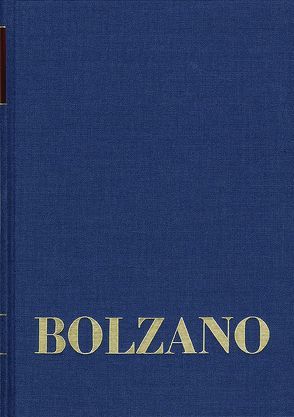
From 1805 to 1820, Bernard Bolzano was professor of »religious doctrine« (Religionslehre) at the University of Prague. The lectures he had to deliver were part of the so-called »Philosophical Studies« that every student of the university had to complete before he entered the »higher« studies, i.e. the studies of medicine, law or theology. As professor of religious doctrine, Bolzano also had the duty to deliver the homilies on Sundays and holidays during the academic year to all the students of the »Philosophical Studies«. This explains the enormous influence Bolzano exerted through these homilies on the intellectual and political life of Bohemia in his time, whose offshoots reached even the Charta 77 movement in former Czechoslovakia. The chairs of religious doctrine were established by the Austrian emperor Franz at all universities of the Austrian empire in order to shape the students into »good Christians and law-abiding citizens« as it was ordered in a decree. The homilies Bolzano had to deliver at the University of Prague (as did all professors of religious doctrine at Austrian universities) were called ›Erbauungsreden‹ (edifying addresses) or ›exhortations‹. There is evidence for 582 ›Erbauungsreden‹ Bolzano delivered as a professor at the University of Prague of which 414 are extant; of these, 153 have not yet been published at all. The 414 ›Erbauungsreden‹ that are extant have survived in different form: some of them (70) as autographs, i.e. in Bolzano’s own handwriting, others in handwritten copies of Bolzano’s manuscripts, others in notes taken by Bolzano’s students. Several collections of Bolzano’s ›Erbauungsreden‹ have already appeared in print, some of them during Bolzano’s lifetime, while others were published posthumously by his students or other editors. – The new critical edition of Bolzano’s ›Erbauungsreden‹ presents all of them in chronological order. Those which are extant will be edited on the basis of the best version which has remained. Those ›Erbauungsreden‹ which are not extant will be documented and described according to an index Bolzano himself has prepared.
Aktualisiert: 2022-08-18
> findR *
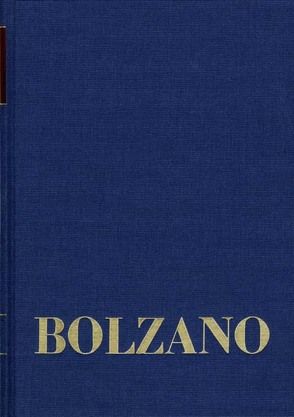
On the third Sunday in November of 1817, Bernard Bolzano began the twelfth annual cycle of his edification speeches. In this academic year he began by dealing with the students’ responsibility to their parents and teachers but also to the opposite (female) sex and the society of mankind as a whole. In four of his speeches, he paid particular attention to the virtue of unselfishness. For Bolzano, the reasonable substantiation of the Christian religion was just as important, since it transcended natural religion in that it could not be explained completely by reason. Again and again Bolzano drew a new boundaries between natural religion and the Christian religion in a constant effort to ultimately establish these precisely. Bolzano‘s attempt to combine faith and reason ended in a balancing act. Although this was admired by some, many however viewed it with suspicion, misunderstood it and increasingly rejected it openly. This was one of the reasons for Bolzano to speak also of “the advantages and dangers in the precoccupation with ideals“ and to draw up clear rules for the creation and application of ideas. In spite of all these difficulties, Bolzano tried to obtain a view of a better world by developing an appreciation of beauty.
Aktualisiert: 2022-08-18
> findR *
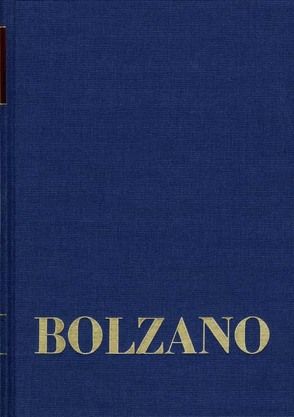
On the third Sunday in November of 1817, Bernard Bolzano began the twelfth annual cycle of his edification speeches. In this academic year he began by dealing with the students’ responsibility to their parents and teachers but also to the opposite (female) sex and the society of mankind as a whole. In four of his speeches, he paid particular attention to the virtue of unselfishness. For Bolzano, the reasonable substantiation of the Christian religion was just as important, since it transcended natural religion in that it could not be explained completely by reason. Again and again Bolzano drew a new boundaries between natural religion and the Christian religion in a constant effort to ultimately establish these precisely. Bolzano‘s attempt to combine faith and reason ended in a balancing act. Although this was admired by some, many however viewed it with suspicion, misunderstood it and increasingly rejected it openly. This was one of the reasons for Bolzano to speak also of “the advantages and dangers in the precoccupation with ideals“ and to draw up clear rules for the creation and application of ideas. In spite of all these difficulties, Bolzano tried to obtain a view of a better world by developing an appreciation of beauty.
Aktualisiert: 2022-08-18
> findR *
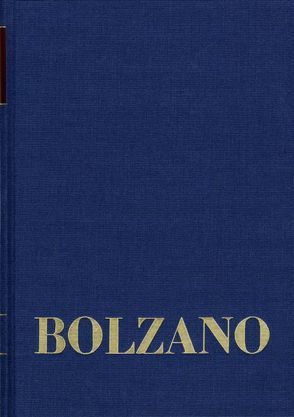
From 1805 to 1820, Bernard Bolzano was professor of »religious doctrine« (Religionslehre) at the University of Prague. The lectures he had to deliver were part of the so-called »Philosophical Studies« that every student of the university had to complete before he entered the »higher« studies, i.e. the studies of medicine, law or theology. As professor of religious doctrine, Bolzano also had the duty to deliver the homilies on Sundays and holidays during the academic year to all the students of the »Philosophical Studies«. This explains the enormous influence Bolzano exerted through these homilies on the intellectual and political life of Bohemia in his time, whose offshoots reached even the Charta 77 movement in former Czechoslovakia. The chairs of religious doctrine were established by the Austrian emperor Franz at all universities of the Austrian empire in order to shape the students into »good Christians and law-abiding citizens« as it was ordered in a decree. The homilies Bolzano had to deliver at the University of Prague (as did all professors of religious doctrine at Austrian universities) were called ›Erbauungsreden‹ (edifying addresses) or ›exhortations‹. There is evidence for 582 ›Erbauungsreden‹ Bolzano delivered as a professor at the University of Prague of which 414 are extant; of these, 153 have not yet been published at all. The 414 ›Erbauungsreden‹ that are extant have survived in different form: some of them (70) as autographs, i.e. in Bolzano’s own handwriting, others in handwritten copies of Bolzano’s manuscripts, others in notes taken by Bolzano’s students. Several collections of Bolzano’s ›Erbauungsreden‹ have already appeared in print, some of them during Bolzano’s lifetime, while others were published posthumously by his students or other editors. – The new critical edition of Bolzano’s ›Erbauungsreden‹ presents all of them in chronological order. Those which are extant will be edited on the basis of the best version which has remained. Those ›Erbauungsreden‹ which are not extant will be documented and described according to an index Bolzano himself has prepared.
Bolzano held more edification speeches in the academic year 1809/1810 that in any other year in which he was teaching. During this time he held 52 of these speeches. Six speeches have been preserved as autographs, there are only notes for four of the speeches, and only the dates are known for two of the speeches. Most of the others are still in existence as transcripts reproduced in facsimile. In the edification speeches held in the academic year 1809/1810, Bolzano’s concept of education, which includes the entire personality, is shown especially clearly. There are twice as many speeches which have a generally advisory content than there are speeches which deal mainly with religious issues.
Aktualisiert: 2022-08-18
> findR *
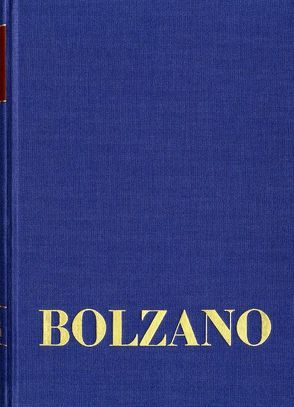
From 1805 to 1820, Bernard Bolzano was professor of »religious doctrine« (Religionslehre) at the University of Prague. The lectures he had to deliver were part of the so-called »Philosophical Studies« that every student of the university had to complete before he entered the »higher« studies, i.e. the studies of medicine, law or theology. As professor of religious doctrine, Bolzano also had the duty to deliver the homilies on Sundays and holidays during the academic year to all the students of the »Philosophical Studies«. This explains the enormous influence Bolzano exerted through these homilies on the intellectual and political life of Bohemia in his time, whose offshoots reached even the Charta 77 movement in former Czechoslovakia. The chairs of religious doctrine were established by the Austrian emperor Franz at all universities of the Austrian empire in order to shape the students into »good Christians and law-abiding citizens« as it was ordered in a decree. The homilies Bolzano had to deliver at the University of Prague (as did all professors of religious doctrine at Austrian universities) were called ›Erbauungsreden‹ (edifying addresses) or ›exhortations‹. There is evidence for 582 ›Erbauungsreden‹ Bolzano delivered as a professor at the University of Prague of which 414 are extant; of these, 153 have not yet been published at all. The 414 ›Erbauungsreden‹ that are extant have survived in different form: some of them (70) as autographs, i.e. in Bolzano's own handwriting, others in handwritten copies of Bolzano's manuscripts, others in notes taken by Bolzano's students. Several collections of Bolzano's ›Erbauungsreden‹ have already appeared in print, some of them during Bolzano's lifetime, while others were published posthumously by his students or other editors. – The new critical edition of Bolzano's ›Erbauungsreden‹ presents all of them in chronological order. Those which are extant will be edited on the basis of the best version which has remained. Those ›Erbauungsreden‹ which are not extant will be documented and described according to an index Bolzano himself has prepared.
The academic year 1812/1813 ended prematurely for Bernard Bolzano. Bolzano‹s beloved sister Franziska was dying, and suffering and night watches aggravated his latent lung disease. The doctors recognized the danger to his health and advised him to stop teaching. An ongoing weakness forced him to stop teaching on 23 May 1813 for the rest of that year and the next two years as well. During this time Bolzano was also unable to hold any edification speeches. In the academic year 1812/1813 Bolzano held 34 speeches, four of which were lost. Half of the other 30 speeches are published in this edition for the first time, most of which according to transcripts which were organized under the direction of his student Michael Josef Fesl, who was the praeses of the seminary in Leitmeritz. Bolzano‹s students henceforth increasingly supported the propagation of his edification speeches.
Aktualisiert: 2022-08-18
> findR *
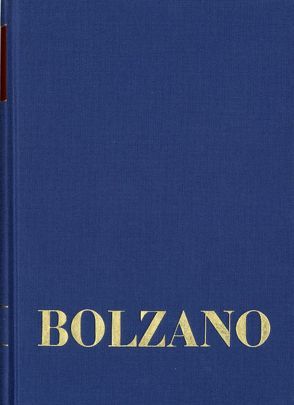
From 1805 to 1820, Bernard Bolzano was professor of »religious doctrine« (Religionslehre) at the University of Prague. The lectures he had to deliver were part of the so-called »Philosophical Studies« that every student of the university had to complete before he entered the »higher« studies, i.e. the studies of medicine, law or theology. As professor of religious doctrine, Bolzano also had the duty to deliver the homilies on Sundays and holidays during the academic year to all the students of the »Philosophical Studies«. This explains the enormous influence Bolzano exerted through these homilies on the intellectual and political life of Bohemia in his time, whose offshoots reached even the Charta 77 movement in former Czechoslovakia. The chairs of religious doctrine were established by the Austrian emperor Franz at all universities of the Austrian empire in order to shape the students into »good Christians and law-abiding citizens« as it was ordered in a decree. The homilies Bolzano had to deliver at the University of Prague (as did all professors of religious doctrine at Austrian universities) were called ›Erbauungsreden‹ (edifying addresses) or ›exhortations‹. There is evidence for 582 ›Erbauungsreden‹ Bolzano delivered as a professor at the University of Prague of which 414 are extant; of these, 153 have not yet been published at all. The 414 ›Erbauungsreden‹ that are extant have survived in different form: some of them (70) as autographs, i.e. in Bolzano’s own handwriting, others in handwritten copies of Bolzano’s manuscripts, others in notes taken by Bolzano’s students. Several collections of Bolzano’s ›Erbauungsreden‹ have already appeared in print, some of them during Bolzano’s lifetime, while others were published posthumously by his students or other editors. – The new critical edition of Bolzano’s ›Erbauungsreden‹ presents all of them in chronological order. Those which are extant will be edited on the basis of the best version which has remained. Those ›Erbauungsreden‹ which are not extant will be documented and described according to an index Bolzano himself has prepared.
Due to the increasing popularity of the edification speeches, 41 of the 51 speeches which Bolzano held in the academic year 1808/09 have been handed down as transcripts and 7 of them as written notes, most of them several times. Two of these are autographs. There are only three texts (numbers 1, 2 and 4) which were lost and these are documented in an autographic index. The ratio of homiletic speeches to generally edifying speeches was the opposite of the first four years (and remained this way until the end of Bolzano’s professional career): Approximately one third of the speeches dealt with exegesis, primarily on important church holidays, and two thirds dealt with educational, ideological and political subjects.
Aktualisiert: 2022-08-18
> findR *
In the academic year 1811/1812, Bolzano held 46 edification speeches. All of these have been preserved completely and in multiple versions, with one exception which has only been preserved in the form of written notes (1812.40). Bolzano‘s own lecture notes for 10 of the speeches serve as a basis for the edition. 22 speeches were previously unpublished. 16 of the 46 speeches deal with religious issues, the other 30 give secular advice.
Aktualisiert: 2022-08-18
> findR *
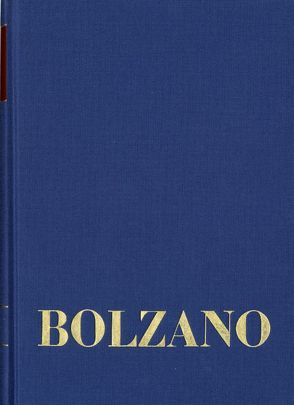
From 1805 to 1820, Bernard Bolzano was professor of »religious doctrine« (Religionslehre) at the University of Prague. The lectures he had to deliver were part of the so-called »Philosophical Studies« that every student of the university had to complete before he entered the »higher« studies, i.e. the studies of medicine, law or theology. As professor of religious doctrine, Bolzano also had the duty to deliver the homilies on Sundays and holidays during the academic year to all the students of the »Philosophical Studies«. This explains the enormous influence Bolzano exerted through these homilies on the intellectual and political life of Bohemia in his time, whose offshoots reached even the Charta 77 movement in former Czechoslovakia. The chairs of religious doctrine were established by the Austrian emperor Franz at all universities of the Austrian empire in order to shape the students into »good Christians and law-abiding citizens« as it was ordered in a decree. The homilies Bolzano had to deliver at the University of Prague (as did all professors of religious doctrine at Austrian universities) were called ›Erbauungsreden‹ (edifying addresses) or ›exhortations‹. There is evidence for 582 ›Erbauungsreden‹ Bolzano delivered as a professor at the University of Prague of which 414 are extant; of these, 153 have not yet been published at all. The 414 ›Erbauungsreden‹ that are extant have survived in different form: some of them (70) as autographs, i.e. in Bolzano’s own handwriting, others in handwritten copies of Bolzano’s manuscripts, others in notes taken by Bolzano’s students. Several collections of Bolzano’s ›Erbauungsreden‹ have already appeared in print, some of them during Bolzano’s lifetime, while others were published posthumously by his students or other editors. – The new critical edition of Bolzano’s ›Erbauungsreden‹ presents all of them in chronological order. Those which are extant will be edited on the basis of the best version which has remained. Those ›Erbauungsreden‹ which are not extant will be documented and described according to an index Bolzano himself has prepared.
Due to the increasing popularity of the edification speeches, 41 of the 51 speeches which Bolzano held in the academic year 1808/09 have been handed down as transcripts and 7 of them as written notes, most of them several times. Two of these are autographs. There are only three texts (numbers 1, 2 and 4) which were lost and these are documented in an autographic index. The ratio of homiletic speeches to generally edifying speeches was the opposite of the first four years (and remained this way until the end of Bolzano’s professional career): Approximately one third of the speeches dealt with exegesis, primarily on important church holidays, and two thirds dealt with educational, ideological and political subjects.
Aktualisiert: 2022-08-18
> findR *
MEHR ANZEIGEN
Bücher zum Thema Erbauungsreden
Sie suchen ein Buch über Erbauungsreden? Bei Buch findr finden Sie eine große Auswahl Bücher zum
Thema Erbauungsreden. Entdecken Sie neue Bücher oder Klassiker für Sie selbst oder zum Verschenken. Buch findr
hat zahlreiche Bücher zum Thema Erbauungsreden im Sortiment. Nehmen Sie sich Zeit zum Stöbern und finden Sie das
passende Buch für Ihr Lesevergnügen. Stöbern Sie durch unser Angebot und finden Sie aus unserer großen Auswahl das
Buch, das Ihnen zusagt. Bei Buch findr finden Sie Romane, Ratgeber, wissenschaftliche und populärwissenschaftliche
Bücher uvm. Bestellen Sie Ihr Buch zum Thema Erbauungsreden einfach online und lassen Sie es sich bequem nach
Hause schicken. Wir wünschen Ihnen schöne und entspannte Lesemomente mit Ihrem Buch.
Erbauungsreden - Große Auswahl Bücher bei Buch findr
Bei uns finden Sie Bücher beliebter Autoren, Neuerscheinungen, Bestseller genauso wie alte Schätze. Bücher zum
Thema Erbauungsreden, die Ihre Fantasie anregen und Bücher, die Sie weiterbilden und Ihnen wissenschaftliche
Fakten vermitteln. Ganz nach Ihrem Geschmack ist das passende Buch für Sie dabei. Finden Sie eine große Auswahl
Bücher verschiedenster Genres, Verlage, Autoren bei Buchfindr:
Sie haben viele Möglichkeiten bei Buch findr die passenden Bücher für Ihr Lesevergnügen zu entdecken. Nutzen Sie
unsere Suchfunktionen, um zu stöbern und für Sie interessante Bücher in den unterschiedlichen Genres und Kategorien
zu finden. Unter Erbauungsreden und weitere Themen und Kategorien finden Sie schnell und einfach eine Auflistung
thematisch passender Bücher. Probieren Sie es aus, legen Sie jetzt los! Ihrem Lesevergnügen steht nichts im Wege.
Nutzen Sie die Vorteile Ihre Bücher online zu kaufen und bekommen Sie die bestellten Bücher schnell und bequem
zugestellt. Nehmen Sie sich die Zeit, online die Bücher Ihrer Wahl anzulesen, Buchempfehlungen und Rezensionen zu
studieren, Informationen zu Autoren zu lesen. Viel Spaß beim Lesen wünscht Ihnen das Team von Buchfindr.
